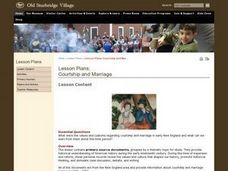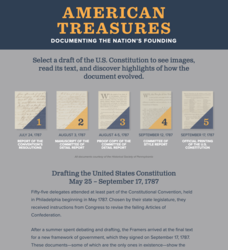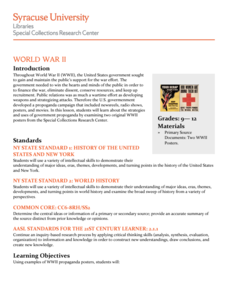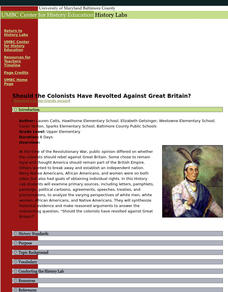Curated OER
Teaching With Documents Lesson Plan: Photographs of Lewis Hine: Documentation of Child Labor
Students interpret historical evidence presented in primary and secondary resources. In this child labor lesson, students examine photograhs by Lewis Hines and discuss the implications of child labor in America.
Urbana School District
Knocking Down Fences
After reading The Other Side and guiding children through a picture walk, third graders investigate evidence of the civil rights movement. In the mini unit, 3rd graders analyze photographs of the past and make connections...
Curated OER
Signature History
Young scholars review the meaning and application of primary and secondary sources in research. They determine how researchers locate primary source documents before looking at signatures as a validating factor on many primary sources....
Curated OER
Differing Expectations
Students examine the expectations that colonists had for lives prior to the revolution. In this colonial America lesson, students read primary documents that feature the perceptions of white men and minorities during the time period....
Curated OER
Historical Events of the Civil War
Fifth graders research the Civil War through the use of primary documents. In this historical events of the Civil War instructional activity, 5th graders write about the information gotten from the primary document. Students answer...
Curated OER
Twentieth Century Entertainment: When Work is Done
Students determine how Americans enjoy leisure time. In this 20th century America lesson, students research primary sources to study how Americans gained leisure time during the century and what they did with it.
Curated OER
Immigration in America
Students use primary sources to study immigration. In this immigration lesson, students analyze photographs, posters, letters, and documents from Ellis Island. Students complete analysis worksheets as they evaluate the primary sources.
Curated OER
Courtship and Marriage
Students research the concept of courtship and marriage as it pertains to early New England and explore the values and culture that shaped our history. In this courtship and marriage lesson, students examine primary source documents that...
Historical Thinking Matters
Rosa Parks: 3 Day Lesson
How can evidence and perspective challenge even the most well-known of stories? Through primary and secondary source analysis, think-alouds, and discussion, young historians evaluate the historical narrative of Rosa Parks across multiple...
Center for History Education
To What Extent Were Women's Contributions to World War II Industries Valued?
Women rose to the challenge when the nation's war effort called them—but were sent home when the GIs came back from World War II. Young historians consider whether the United States valued women's contributions during the war using a...
Curated OER
Royal Proclamation on Education: King Chulalongkorn of Siam
How much did the King of Siam value education? Why did he believe haste was important? How do his views compare with modern views of education? These are the questions your class will answer after reading an excerpt from the "Royal...
Civil War Trust
Transcribing Civil War History
Primary sources are valuable for understanding the context of historical events, but the diction and dialect in these documents can be difficult to understand. Middle and high schoolers participation in a transcription process in which...
Curated OER
Excerpt: Cecil Rhodes' Confession of Faith (1877)
Consider the words of Cecil Rhodes after reading this short excerpt from his publication, Confession of Faith. Upper graders read the excerpt then answer two questions analyzing the view of Africans toward his praise of British...
Curated OER
Imperialism: J.A. Hobson (1902)
J.A. Hobson was a popular writer, economist, and critic of Imperialism. Learners will read a short excerpt from one of his publications and answer two, two-part questions regarding his views on Western imperialism in Asia. Tip: Ask your...
Middle Tennessee State University
The Invention of the Telephone
All of the people in your class would agree that life would be different without the invention of the telephone! Study Alexander Graham Bell's most famous and influential invention through the primary source document of his...
National Constitution Center
American Treasures
Just how long did it take the framers to write the Constitution? What role did the drafting process play? Scholars examine various drafts from the Constitutional Convention to gain a better understanding of its formation. Interactive...
Syracuse University
World War II
During World War II propaganda was as important to the war effort as the soldiers in the field. Scholars consider how the government communicated messages of patriotism with propaganda by examining pieces from World War II. Then, they...
DocsTeach
Lincoln's Suspension of Habeas Corpus During the Civil War
What is the balance between constitutional rights and security during a war? Young historians debate the question while looking at Lincoln's decision to suspect habeas corpus during the Civil War. After reviewing his order, discussion...
Center for History and New Media
Founding of the Laurel Grove School and Other "Colored" Schools in Fairfax County, 1860–1890
The right to public education was not always so clear in American history. Readers study several primary and secondary source documents, including property deeds, maps, and photographs, about the founding of local schools during the...
Center for History Education
Should the Colonists Have Revolted Against Great Britain?
Should the Americans have taken the plunge and revolted against Great Britain? Using documents, including the famed Common Sense and a Loyalist response, pupils conduct a lengthy investigation of the question. The interesting resource...
US National Archives
WWII: Western Europe 1939-45 – Occupation
Warsaw, Poland, suffered much of the blunt of World War II—but according to Polish letters from the early days of Nazi occupation, other parts of the country were much worse off. High schoolers use the letters and contemporaneous...
DocsTeach
Suffrage Photograph Analysis
Votes for women! Young scholars use images to explore the suffrage movement and its impact on the United States. Historians work in groups or pairs to interpret the photograph, complete a worksheet, and discuss how their opinions of the...
DocsTeach
Red Record of Lynching Map Analysis
Long before the civil rights movement, leaders were working to secure equal rights. An informative activity explains the 1922 anti-lynching campaign with a map. Scholars analyze the map, complete a worksheet, and participate in group...
University of Wisconsin
Why Did the Triangle Fire Occur?
An investigation of the 1911 New York City Triangle Shirtwaist Factory fire leads class members to examine primary and secondary source materials related to the event and apply what they learn about the working conditions at the time to...























